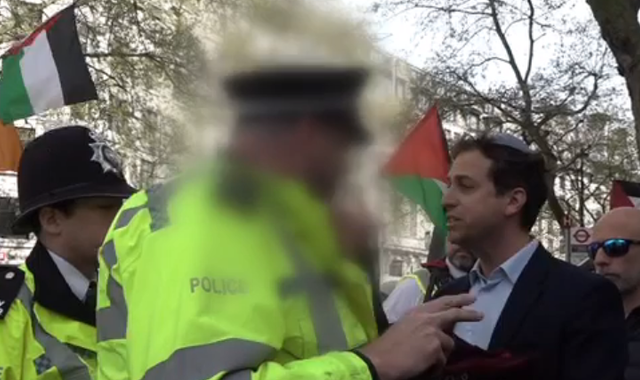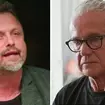Met Police chief defends officer who called campaigner 'openly Jewish' - as minister calls incident 'unacceptable'
23 April 2024, 05:51 | Updated: 23 April 2024, 11:03

People should not be prevented from going about their day-to-day lives, a government minister has told Sky News, following a row over the police handling of a pro-Palestinian demonstration.
Footage showed a Metropolitan Police officer preventing campaigner Gideon Falter, the chief executive of the Campaign Against Antisemitism, from crossing a road near the march in London.
The officer said Mr Falter, who was wearing a kippah skull cap, was "openly Jewish" and that he was "worried about the reaction" to his presence at the demonstration.
Mr Falter has since called on Met Police chief Sir Mark Rowley to resign and accused the force of "victim-blaming" following the encounter.
Extended footage of the incident shows the officer accused Mr Falter of wanting to walk against the flow of the march and of being "disingenuous" in his claim he wanted to simply cross the road.
He offers the campaigner safe passage at a different location which is declined. As the tension rises and the officer raises his voice Mr Falter repeatedly tries to push past him.
Sir Mark has defended the actions of his officer during the incident on 13 April, saying they were "professional", while admitting some of the words used during the exchange were "clumsy and offensive".
Asked about the row, illegal migration minister Michael Tomlinson said he thought police had a "difficult job" at the protests but the incident was "unacceptable".
He told Sky News's Kay Burley: "I don't think anyone of faith, whether you're Jewish, whether you're a Muslim, whether you're a Christian, should be prevented from going about their day-to-day lives."
Mr Falter has since said he will turn up at the next pro-Palestinian march and encouraged other Jews and allies to join him.
Asked whether police should stop him, Mr Tomlinson said: "I don't want to see people stopped from going about their day-to-day lives in London."
Rowley defends officer in protest row
Sir Mark defended the actions of his officer, who he said would not be sanctioned and would be allowed to police protests again.
In an interview with The Guardian newspaper, he said: "The sergeant at the scene clearly assessed that there was a risk of confrontation and was trying to help Mr Falter find a different route.
"I completely understand why the sergeant made this assessment. A couple of turns of phrase were clumsy and offensive... and we've apologised for that.
"The wider actions and intent of the officer were professional and in the best tradition of British police trying to prevent disorder."
The Met Police commissioner said the officer was correct to stop Mr Falter after fearing there was danger of violence or disorder if direct contact with the pro-Palestinian marchers was made.
Met chief meets with home secretary
Sir Mark made the comments ahead of a meeting with Home Secretary James Cleverly on Monday.
After the meeting, Mr Cleverly said: "Jewish people will always have the right to be able to go about their daily lives safely and freely, in London and across the UK.
"Sir Mark has reassured me he will make this clear to all sections of the community as a matter of urgency. The Met's focus now is rightly on reassurance, learning from what happened, and ensuring that Jewish people are safe and feel safe in London. I support them in that critical endeavour."
Sir Mark also met with London's mayor Sadiq Khan, who said he had "full confidence" in the commissioner - as well as with Jewish community groups.
Read more:
Analysis: What happens now for Met Police chief?
Review into Met's handling of latest Stephen Lawrence evidence
Following the meeting, the Community Security Trust said the Met representatives repeated their apologies and agreed to "consult more closely" with the Jewish community "to ensure greater cultural sensitivity in future communications".
The Met Police has apologised twice over the incident, issuing one initial statement and then saying sorry for its first apology, which had suggested opponents of pro-Palestinian marches "must know that their presence is provocative".
(c) Sky News 2024: Met Police chief defends officer who called campaigner 'openly Jewish' - as minister calls incident 'unacceptable'

























